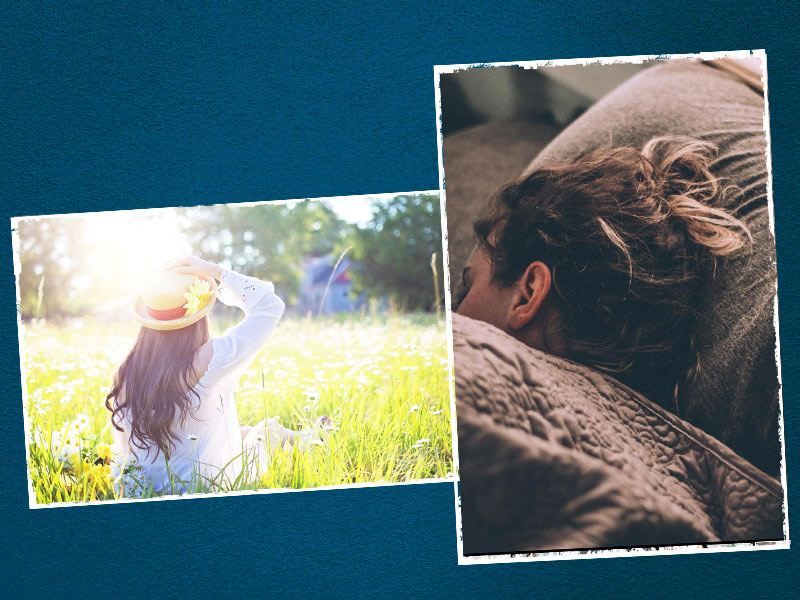
A good night’s sleep is crucial for sound physical and mental health. This is a known fact. Not just that, it has a direct impact on your mood, too. A good quality sleep gives your brain the time and space to unwind and relax, and at the end of it, you feel rejuvenated and calm. On the other hand, a state of sleep deprivation, whether caused by poor quality sleep or no sleep at all, can make you feel tired the next morning. You are also cranky and irritable. With the increased pace of modern life, stress and anxiety have become quite common, and so have sleep-related disturbances. Although popping a pill (on the doctor’s recommendation) can seem like a convenient way out. But these aren’t devoid of side effects. That leaves us with natural ways, and there are many, with one of them present right outside your window. Among the factors crucial for a good night’s sleep that experts recommend, exposing yourself to enough sunshine is one of them.
Possible Causes For Disturbed Sleep

Before delving into how enough daytime sunlight can help you with sound nighttime sleep, let us look at the possible factors that can disrupt sleep.
- Caffeine: Being a stimulant, caffeine is meant to keep you awake and alert. Hence, having tea or coffee close to your bedtime can make it difficult for you to fall asleep.
- Alcohol: This is another stimulant known to disrupt sleep.
- A Long Nap: Taking a long daytime nap makes it difficult to fall asleep in the night is something we all have experienced.
- Screentime: Spending time on your phone or in front of the TV messes up your sleep. The key lies in your circadian rhythm, something that we’ll explore in this article.
- Sleep Routine: When you don’t have a sleep routine, it makes it difficult for you to fall as well as stay asleep.
Other than these, having heavy food or exercising heavily close to bedtime are the other known sleep disruptors. Mental health issues can also cause sleep disturbances. If this is the case, you must consult a mental health professional for good guidance.
Also read: Is Your Racing Mind Not Allowing You To Get A Good Night's Sleep? Some Tips That Might Help
How Sunlight Can Induce A Good Quality Sleep

Before looking at the ‘how’, let’s know if this is the case. If exposure to sunlight helps with better sleep. According to 2017 studies involving office goers, those exposed to ample daylight whether in the form of bright sunlight or enough light in the office were able to sleep better and felt less depressed and stressed than those who weren’t. The key is to get yourself exposed to more light during the day and less at night. When it comes to electrical lights, the one rich are short-wave blue light is beneficial. However, for getting daylight, what’s better than exposing yourself to sunlight? Not only will it help you with sleep, but will provide you with vitamin D too.
Now coming to the ‘why’.
The answer lies in circadian rhythm.
- Humans, just like every other organism on this planet, have an internal clock known as the circadian rhythm. It’s regulated by the sun’s day and night cycle.
- These control everything from sleeping and eating to mating.
- Although research continues on circadian rhythm, what is known is that it is regulated by the hypothalamus in our brains.
- It’s dictated by a group of nerve cells present in the hypothalamus, which, in turn, are connected to our optic nerves.
- Hence, when it’s light outside, the optic nerves send signals to the brain. Our temperature rises, the heart rate increases, and the secretion of a hormone called melatonin is controlled.
- Melatonin is the hormone responsible for making us fall asleep.
- The opposite happens when the sun sets. When this signal reaches the brain, our temperature drops, and so does the heart rate, and the melatonin’s secretion is triggered, making us fall asleep.
Also read: Not Just Typical 8 Hours Sleep, Here Are 7 Kinds Of Rest Every Person Needs
According to the researchers of this study, when you expose yourself to more light during the day and less at night, it calibrates the circadian rhythm, helping you with better sleep. On the other hand, activities such as spending time on your phone disrupt it. This is because the screen emits blue light, which is similar to sunlight. Your body perceives it as a signal that it’s still light outside and makes you alert and active, thus, disrupting sleep.
Another study that came out in 2020 also made similar findings. According to it, among the factors that affect the duration of sleep, exposure to sunlight plays an important role as it plays a pivotal role in regulating the circadian rhythm. Hence, for better sleep, get yourself enough sunlight.
Photo Credit: Pixabay/Unsplash/Freepik
Also watch this video
How we keep this article up to date:
We work with experts and keep a close eye on the latest in health and wellness. Whenever there is a new research or helpful information, we update our articles with accurate and useful advice.
Current Version